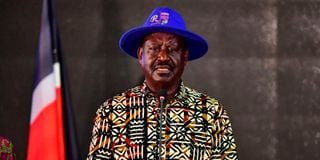Poll disputes a priceless gift to posterity

Azimio la Umoja One Kenya presidential candidate Raila Odinga speaks during a press conference at the Kenyatta International Convention Centre (KICC) in Nairobi on August 16, 2022.
What you need to know:
- The freedom to dispute electoral results in court is a hard-won victory in this country. It was a gain that was fought for over many years.
- Disputes must be resolved in court, without any incitement of Kenyans to violence.
- Disputes sharpen quality control and assurance that all the issues have been resolved is key to maintaining public goodwill and poll participation.
The August 9 presidential election was very close.
As the results streamed in throughout the week, the lead seemed to swing like a pendulum, with the two frontrunners alternately taking the lead as the tallying progressed.
Since then, Dr William Ruto has been declared president-elect by the chairperson of the Independent Electoral and Boundaries Commission (IEBC), beating his closest rival Raila Odinga.
Four IEBC commissioners, led by the vice-chairperson, have disowned the results.
Further, Mr Odinga, backed by the Azimio la Umoja coalition, has declared that he intends to formally dispute the results in the Supreme Court.
The freedom to dispute electoral results in court is a hard-won victory in this country. It was a gain that was fought for over many years.
In 2017, Kenya became the first African country where the Supreme Court nullified the re-election of a sitting president, prompting a repeat race for the presidency two months later.
As such, three follow-up reflections enable us to start to consider the context of electoral disputes, which have been marked by notable tensions since Kenya’s independence almost 60 years ago.
The first thing to consider is the gift, however dubious, that electoral disputes give our legal and court processes.
They lead to the essential delineation of electoral misdeeds and errors. They also serve to sieve and remove any ambiguous wording in legislation, which is important for the next rounds to come.
Destruction of property
Second, it is always better to lodge disputes in court if there is reason to question the result of an election, and not among politicians, political parties and the public.
Kenyans have suffered a lot as a result of matters directly related to the electoral process; death and destruction of property, maiming and displacement of hundreds of thousands, and so on.
Disputes must thus be resolved in court, without any incitement of Kenyans to violence.
Third, electoral disputes strengthen the Constitution, increasing public trust in the electoral process and institutions.
It has been noted that Kenya has expensive elections compared to other countries around the world.
While the discovery that, for instance, security features of a coloured photograph on a ballot are considered a luxury in some countries, thus contributing to the cost, Kenyans need concrete assurance that all expenses on their elections translate to honest, reliable and efficient handling on the ground.
Disputes sharpen quality control and assurance that all the issues have been resolved is key to maintaining public goodwill and poll participation.
However tedious and anxiety-inducing, handling of poll disputes in court as people go about their daily business is definitely a sign of maturing democracy.
While it may not assure any election loser of a later win, the pursuit of just proceedings to ensure fair polls directly contributes to Kenya’s peace and prosperity, now and in the future.
Ms Okore is a policy analyst. [email protected]





